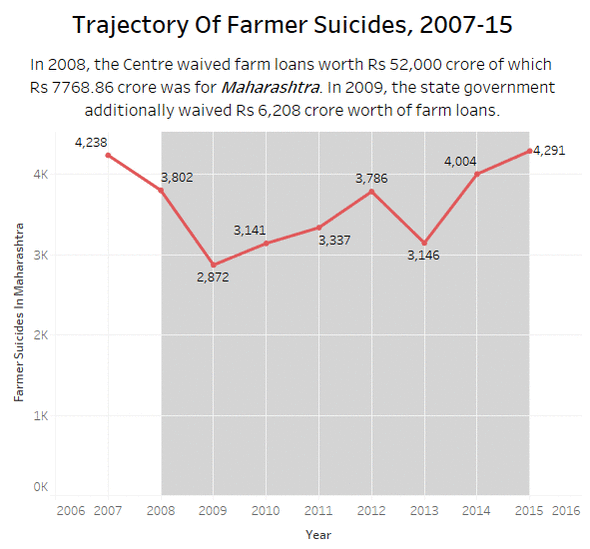Rajasthan Becomes Third BJP State To Waive Farm Loans; Rs 1.07 Lakh Cr Nationwide In 2017
Rajasthan announced a Rs 20,000 crore farm-loan waiver on September 14, 2017, making it the fourth Indian state--and the third with a Bharatiya Janata Party (BJP) government--to waive agricultural loans in 2017. Uttar Pradesh waived Rs 36,359 crore in April 2017, Maharashtra waived Rs 30,000 crore in June 2017, while Congress-ruled Punjab announced a waiver amounting to Rs 20,500 crore in June 2017.
"The announcement--which waived loans of up to Rs 50,000--came after a marathon meeting lasting 11 hours," the Hindustan Times reported on September 14, 2017. "The farmers were demanding waiver of all loans amounting to Rs 49,500 crore but the government was adamant that as per records, the loans amounted to Rs 19,700 crore. After three rounds of talks through the day, the two sides finally reached an agreement."
As demands for farm-loan waivers grow, India faces a cumulative loan waiver of Rs 3.1 lakh crore ($49.1 billion), or 2.6% of the country's gross domestic product (GDP) in 2016-17, IndiaSpend reported in June 2017. This analysis did not include Rajasthan.
Over nine years to March 2017, the central and state governments waived Rs 88,988 crore ($13.9 billion) in loans to 48.6 million farmers. The waivers were primarily meant to discourage suicides by farmers, apparently caused by widespread indebtedness. However, an IndiaSpend analysis showed this had little or no impact on suicide rates, probably because 32.5% on average, or 79.38 million, small and marginal farmers across India (with farm holdings of less than 1 to 2 hectares in size) rely on informal sources of credit.
Meanwhile, loan waivers have led to a rise in the non-performing assets of banks, especially public-sector banks, and are likely to have a significant bearing on the state and national fiscal deficits.
On average, a third of Indian small and marginal farmers have access to institutional credit. This means no more than 10.6 million of 32.8 million small and marginal farmers in the eight states demanding loan waivers could benefit from debts being written off.
The other 22.1 million farmers depend on moneylenders and relatives for borrowings, according to the 2011 agricultural census and the National Sample Survey Office's 2013 situation assessment survey of farm households, the latest available data.
Source: National Sample Survey Organisation's 2013 situation assessment survey of farm households
Previous farm loan waivers did not reduce farmer suicides, our analysis of national crime data showed.

Source: National Crime Records Bureau data for 2007, 2008, 2009, 2010, 2011, 2012, 2013, 2014 and 2015
At least nine farmers in Rajasthan have committed suicide in 2017, NDTV reported on August 28, 2017. "The government however insisted the reason for the nine farmer suicides is not agricultural distress," the report said.
In a decade to 2015, 4,329 farmers committed suicide in Rajasthan.
Source: Accidental Deaths & Suicide reports, National Crime Records Bureau
While loan-waivers provide no more than temporary relief, they place a significant burden on public finance and the economy and they "engender a moral hazard", Reserve Bank of India governor Urjit Patel cautioned on April 6, 2017.
"Waivers undermine an honest credit culture… It leads to crowding-out of private borrowers as high government borrowing tend to (impose) an increasing cost of borrowing for others," the RBI governor said, calling for a consensus among states on loan waiver promises. "Otherwise sub-sovereign fiscal challenges in this context could eventually affect the national balance sheet."


